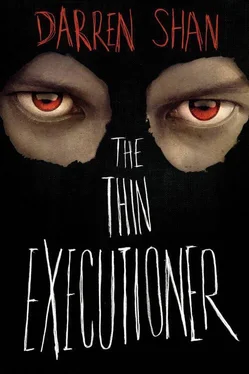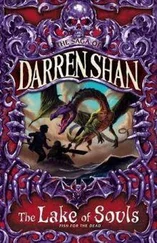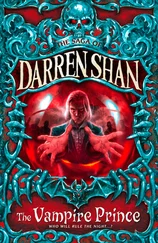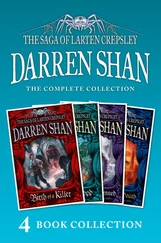“No,” Tel Hesani said, barely moving his lips. “Be quiet.”
When all of the tents had been erected, the people gathered in the center of the triangle. Loaves of bread and several large fish were taken out of bags, broken up, and passed around. Everybody took two chunks of bread and one piece of fish. The fish weren’t cooked, and the bread was almost hard enough to snap their teeth, but Jebel and Tel Hesani ate ravenously. When all had eaten, a bag of raw potatoes was opened, and each person was given one. Then mushrooms were handed around, and finally a fruit that tasted like a sour plum.
Qasr Bint didn’t eat with the others. He stayed in his tent. After dinner, everyone knelt and prayed again. Jebel and Tel Hesani shuffled across to join them, but a man with crazy green eyes shook his head and pointed at the tall tent. They shared an uneasy glance, then advanced to the tent, where they stopped, wondering how to announce themselves. Before they could decide, Qasr Bint said, “Enter, my sons.”
Jebel had been expecting grandeur, but the tent was no different from the one they had slept in. Qasr Bint sat cross-legged in the center, and there was no sign of a blanket or cushions. He gestured for them to sit, then began talking.
“Your names are unimportant. All of my children abandon their names when they join my noble mission. But I will have them anyway.”
Once Qasr Bint had committed their names to memory, he continued. “We are the Um Biyara. Biyara is the world of the afterlife, where the spirits of the rich go when their bodies die. You are aware that usually only a wealthy man can buy a place for his spirit in Biyara?”
Tel Hesani shook his head, but Jebel nodded, recalling his lessons at the hands of Blair and Bush.
“Our gods are as materialistic as we are,” Qasr Bint explained. “They welcome the rich and damn everybody else to nothingness. But wealth is not just measured by the amount of swagah a man accrues over the course of his life. There are other ways to earn the favor of the gods.
“The wealthy families of Abu Saga used to hate the Um Biyara, because we brought hope to the masses. For generations they hunted us and tried to stamp us out. But now many of them have seen the error of their ways. They realize that by aligning themselves with the Um Biyara, they increase their chances of finding a place in the afterlife.”
Qasr Bint rocked backwards, a glint in his eyes. “We knew our day would come if we waited long enough, and now it has. The rich have sought us out in recent times, eager to ensure that they are accepted by the gods when they die. For decades such liaisons were kept secret, but that is changing. Even the high lord acknowledges us now. We can express our beliefs openly, and our more powerful followers protect us from those who would cut us down.”
Tel Hesani coughed politely. “What are your beliefs, exactly?”
“All people are sinners,” Qasr Bint said. “The gods forgive the sins of the rich — every Um Saga accepts that fact. But we believe that there is hope for the poor too. If they atone for their sins by punishing themselves, and offer up their suffering to the gods instead of swagah, the gods will look kindly on them. Once fully cleansed, they can be killed, and their spirits will prosper in Biyara.”
“ Killed? ” Tel Hesani frowned.
“Of course,” said Qasr Bint. “We cannot leave them to die a natural death. They are weak creatures. They would sin again if given the opportunity.”
“You mean all of the people with you will be slaughtered?” Tel Hesani gasped.
Qasr Bint nodded. “For some, death will come soon. For others it will be years, maybe decades. It depends on how much punishment they can take. A person’s capacity for pain is linked to the magnitude of their sins. One who has sinned lightly will tire shortly. Grievous sinners struggle on longer. Every last sin must be clawed, cut, burned, and whipped out of a person. Once they reach that exalted state, they earn the acceptance of the gods, and we grant them a blessed execution on the spot, before they are infected again by the foulness of this world and lose their place in Biyara.”
Tel Hesani stared at Qasr Bint, appalled. The Um Biyara chuckled. “You don’t understand. I didn’t expect you to. But I will help you see the light.”
Tel Hesani shook his head. “It may be foolish of me to say this, but your beliefs are immoral. Holy men should seek the good in people, not the bad.”
“But that is what we do,” Qasr Bint argued. “We expose the good by whittling away the bad.”
“No,” Tel Hesani said. “You encourage people to see wickedness in themselves where there probably isn’t any. I cannot believe that any god would accept pain and suffering as payment for a person’s spirit. No god could be that vicious.”
Qasr Bint’s forehead creased, and there was a long, uncomfortable silence. “I see now,” he muttered. “You have been sent to test me, to make me bring any hidden doubts to the surface and examine them.”
“What makes you so sure that we have anything to do with you?” Tel Hesani asked. “Maybe our paths crossed by accident, not design.”
Qasr Bint laughed. “You are a true demon! I’ll have to stay on my toes around you. But that is as it should be. Feel free to challenge me. I will answer all of your questions and strive to convert you to the true religion.”
“And if you can’t?” Tel Hesani said.
“Then I’ll kill you anyway. If a spirit can’t be saved, it must be extinguished for the good of everyone else — we can’t have you running around infecting others with your vileness.”
“So we’re damned either way,” Tel Hesani said bitterly.
“Not at all,” Qasr Bint protested. “Dead if you win and dead if you fail, yes. But not damned. If I convert you, your spirits will be saved — the gods accept those of other nations too, once their price has been paid. Now, if you’ll excuse me, I need to meditate.”
Qasr Bint gestured towards the exit. Tel Hesani rose, but Jebel remained sitting. There was one question that hadn’t been answered, and he was curious.
“Yes, my child?” Qasr Bint said.
“Your followers,” whispered Jebel. “You say they’re all sinners and that’s why they have to cut and whip themselves.”
“That is so,” Qasr Bint agreed.
“What about you?” Jebel asked. “Why don’t you torment yourself? Are you rich?”
Qasr Bint smiled condescendingly. “I am not wealthy, no, but I am not a sinner either. I am one of the fathers of the Um Biyara, a direct link between the living and the dead. My blood is pure. I have been raised without sin; therefore the gods will accept my spirit when I die.”
Jebel gulped. “Then why don’t you let us kill you , in case you commit a sin in the future? Other people are killed once they’re cleansed. If you’re already clean, why not offer yourself up now, to ensure the safety of your spirit?”
Qasr Bint’s expression darkened. “Get out,” he growled.
Jebel rose and smiled grimly at the leader of the Um Biyara. “You’re nothing but a twisted trickster who likes to watch people suffer,” he said, then walked out ahead of a stunned Tel Hesani and a quivering Qasr Bint.
The slow, steady march continued over the next few weeks, the same pattern as the first day — prayers to begin with, a meager meal at the end of each day, and more prayers when they camped.
After a couple of days, some of the Um Biyara asked Qasr Bint why the slaves were not punishing themselves. He said it was because they weren’t converts. The Um Biyara asked if it was wise to let an unclean pair march freely with them. Qasr Bint slept on the matter and was struck by inspiration during the night.
Читать дальше







